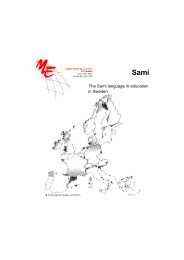Multilingual Early Language Transmission (MELT) - Mercator ...
Multilingual Early Language Transmission (MELT) - Mercator ...
Multilingual Early Language Transmission (MELT) - Mercator ...
Create successful ePaper yourself
Turn your PDF publications into a flip-book with our unique Google optimized e-Paper software.
6.5 Challenges for the future<br />
At micro level, most important of all in the processes of raising our children through<br />
languages is the constant (and continuously to be encouraged) awareness of parents and<br />
their peers that they have a choice. They should be aware that multilingual upbringing can<br />
foster a child’s cognitive development and further language learning, provided that<br />
appropriate conditions are met. Parents are responsible for raising their children in both<br />
languages or either language, to guide the children through immersion education, bilingual<br />
or monolingual courses, to apply the one person – one language approach or any other wellthought-out<br />
approach, and to read aloud with their children as much as reasonably possible.<br />
The practitioners involved in these provisions and approaches are expected to guide the<br />
parents and peers towards that choice. They are considered to be experts and, indeed,<br />
parents will expect clear answers on a great variety of questions, although in most cases<br />
their training is insufficient. Therefore, within the European and national policies regarding<br />
the improvement of quality of practitioners, a bachelor degree, specially developed modules<br />
and tailor-made internship must be developed. Within vocational training courses those<br />
modules and internship courses must be certified, both for the school and for the individual<br />
student.<br />
At meso level, regional and local educational authorities should take it as their responsibility<br />
to insist on the integrative or holistic approach of the health and wealth organisations in<br />
cooperation with vocational training. This vision of the development of the child as a totality<br />
must include not only aspects of physical growth and health, but also a balanced approach<br />
towards language acquisition appropriate for the child in its linguistic environment. The<br />
relationship between formal education and language learning activities in non-formal<br />
contexts should be strengthened.<br />
At macro level, national governments should include in their educational policy not only an<br />
increase of participation of pre-school education, which is proclaimed by the EU in the<br />
Agenda 2020, but must also give priority to the improvement of the continuity of language<br />
learning through primary school and secondary education. National legislation must be<br />
based on equality of the target languages and aimed at full language development.<br />
With respect to the training of practitioners and day care servants, sufficient provisions for<br />
teacher training must be guaranteed, including in-service training programmes. Training<br />
programmes must include promotion awareness programmes focussing on balanced<br />
plurilingualism, as well as methodologies of immersion and language acquisition approaches<br />
in various linguistic settings. Such programmes can be developed and targeted at speakers of<br />
regional minority languages as well as immigrant languages.<br />
At macro level, European organisations should encourage all policy makers and stake holders<br />
to express the same positive attitudes towards multilingualism and language maintenance.<br />
The importance of communication in different languages and language learning from a<br />
lifelong learning perspective should include continuous attention for first language/mother<br />
tongue acquisition. Furthermore, the concepts of “Equity, Quality, Consistency and<br />
Continuity” (<strong>Language</strong> Learning at Pre-primary school level 2011 p. 9) should be applied to<br />
smaller state languages and regional & minority languages as well as immigrant languages.<br />
The European organisations also should encourage national governments to develop<br />
common standards of quality of practitioners in terms of language skills and didactic skills for<br />
83



